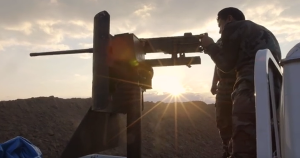Western military intervention via Special Forces is already underway in Libya, without formal authorisation from the unity government. Instead, the US and some large European countries seem to be working directly with specific Libyan armed groups: above all, the city-state of Misrata and General Khalifa Haftar’s Libyan National Army.
This works against the political efforts to strike a power-sharing deal including these groups. Each group involved in these bilateral relations is working on the assumption that they will become the equivalent of the Iraqi Peshmergas. That is, in exchange for fighting (or pretending to fight) ISIS, they expect to receive weapons and political support – even a de facto recognition of their autonomous control of territory.
A clear example of this phenomenon is the help from Egyptian and French Special Op forces to Haftar’s Libyan National Army, which has been advancing on Benghazi since February.
This type of direct support from abroad has strengthened the sense of many politicians and military leaders in eastern Libya that they don’t need to strike a power-sharing deal with the forces now supporting the unity government – first and foremost Misrata – in order to have good relations with the US and Europe.
Not by chance, the House of Representatives has repeatedly failed to take two crucial steps to move the political process forward: voting on the Government of National Accord, and amending the constitutional declaration to implement the Libyan Political Agreement. On at least three occasions, a minority of MPs close to House Speaker Agila Saleh and General Haftar have physically blocked other MPs from voting in support of the Serraj government and the agreement.
On the other hand, US and European attempts to pressure Serraj and the Presidential Council to give a green light to other forms of military intervention have run up against two political realities in Libya:
• The Presidential Council is portrayed by its opponents as a foreign puppet, installed in Tripoli only to
give the go-ahead to military intervention. Serraj is unlikely to request any form of Western military intervention for the time being, to avoid giving weight to these accusations. He made this explicit to several European foreign ministers who visited him in April 2016.
•Military intervention would require a number of political decisions on the structure of Libya’s security
sector, so that it could either fight ISIS or receive training from foreign forces. The Presidential Council would have to decide on a new military leadership and a national security council. But to do this, it
needs the power-sharing deals that are hindered by the West’s use of Special Forces and the direct relationships with the various potential “Peshmergas of Libya”, among other things.
Stepping up political efforts
There is no doubt that force is needed to eradicate ISIS from Libya, and that the unity government will need foreign assistance to build a credible and accountable security sector capable of subduing the hundreds of militias in the country.
Yet these are not mere technical decisions, and they cannot be solved with a capacity-building exercise. These are deeply political efforts. Reforming Libya’s security sector means reforming Libya’s entire power structure, which in turn affects the role that regional actors play in the country.
Instead of pretending that their Special Ops interventions will not harm the political process, the EU and its member states should bring their military strategy against ISIS into line with their support for the unity government.
www.ecfr.eu



